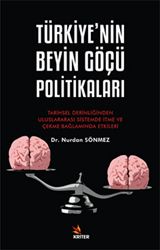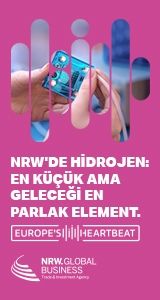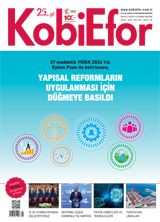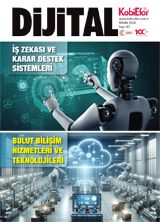AVRASYA EKONOMİ ZİRVELERİ
9-10-11 Nisan 2013 günleri; Cumhurbaşkanları, Meclis Başkanları, Başbakanlar, Bakanlar, Prensesler ve Prensler 16. Avrasya Ekonomi Zirvesi’nde İstanbul’da biraraya gelecekler. (On April 9–11, 2013 Presidents, Speakers of Parliament, Prime Ministers, Ministers, Princes and Princesses will come together at the 16th Eurasian Economic Summit in Istanbul.)
KAPAK
01.04.2013, 17:44 01.04.2013, 17:44
13904
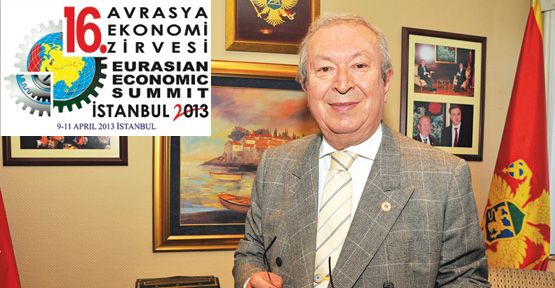
| Dr. Akkan Suver, 16. Avrasya Ekonomi Zirvesi'ni bu yil, “Tek kutuplu dünya mi, çok kutuplu dünya mi?” basligi altinda ve paralel on oturumla gerçeklestireceklerini açikladi. Sivil toplum kimligiyle, elli ülkenin en üst düzeyde temsiline imkan saglayan Avrasya Ekonomi Zirvesi'ni Dr. Suver, resmi zevatin sivil inisiyatifin davetine icabetini, resmi sahsiyetlerin sivil inisiyatifle bulusmasi olarak degerlendirdi. Marmara Grubu Vakfi Genel Baskani Dr. Akkan Suver'in sorularimiza verdigi cevaplari asagida bulacaksiniz. Avrasya Ekonomi Zirveleri Türkiye'nin bu bölgedeki iktisadi, siyasi, kültürel pozisyonuna ne gibi katkilar sagladi? Akkan Suver: Avrasya Ekonomi Zirveleri, Türkiye'nin Balkanlar'da, Kafkasya'da, Orta Asya ve Ortadogu'da mevcut olan istikrarli itibarinin çitasinin daha da yükselmesini temin etmis bir sivil toplum hareketidir. Avrasya yoluna çiktigimizda alti ülke yanimizdaydi. Alti ülke ile Dedeman Oteli'nin salonlarindan Kafkasya ve Orta Asya'ya seslenerek basladigimiz yolculugumuz bu yil on alti yasinda. Araliksiz olarak on alti yildir bir sivil toplum kurulusunun, her yil artan bir düzeyde yükselttigi bu çita bugün Afrika'dan, Latin Amerika'dan ses getirmektedir. Bu önemli bir birlikteliktir. Demokrasi açisindan, insanlarin gelecegi açisindan baris adina diyalogla gelistirdigimiz Avrasya Ekonomi Zirveleri'nin karakteristigi, sivilin davetine icabet eden resmilerin, sivil inisiyatife olan yüksek itimatlaridir. Evet, Marmara Grubu Vakfi, sivil kimligiyle bugün dünyada kabul gören uluslararasi bir birlikteliktir. On alti yilda Avrasya'da olusturdugumuz performansi, bu yil ortaya çikan katilimlar dogrultusunda degerlendirecek olursak, adimizin yalniz bir simge olarak kabul edildigi, gerçekte ise Çin'den Peru'ya uzanan bir çizgiyi kapsadigi görülecektir. Bu büyük bir basaridir. Ve bu basarida imzasi olanlarin tamami idealist düsüncenin sahibi bir avuç insandir. Bu bir avuç insan, adeta dünyayi sirtlarcasina, elliden fazla ülkenin, iki yüzden fazla yüksek sahsiyete kendi mütevazi imkanlariyla ev sahipligi yapmaktadir. Bana inanarak, çiktigim yolda beni yalniz birakmayan dava arkadaslarim, baris adina, istikrar adina refahin bölüsülmesi adina insanliga karsiliksiz bir hizmette bulunmaktadirlar. Kendilerine minnettarim. Avrasya Bölgesi'ndeki ülkelerin Türkiye'ye dönük ilgi ve iliskileri Avrasya Ekonomi Zirveleri ne yönde ve nasil etkilendi? Akkan Suver: Onalti yilda, ortaya koydugumuz itibar bizi Avrasya sinirlarinin disina tasidi. Afrika'dan Latin Amerika ülkelerine kadar bir cografyada, Avrasya Ekonomi Zirveleri artik kabul gören uluslararasi bir prestij birlikteligi olarak degerlendirilmektedir. Daha genis bir deyimle yalniz devlet adamlari tarafindan degil, is dünyasinca da takdir edilen Avrasya Ekonomi Zirveleri din adamlarinin da ilgisini çekmektedir. Katolik dünyasinin, Ortodoks birlikteliginin, Müslüman aleminin, Musevilik camiasinin ve Budist çevrelerin temsil edildigi Avrasya Ekonomi Zirveleri'ne Prenses, Prens düzeyinde de katilimlar olmaktadir. Mütevazi imkanlarla gerçeklestirdigimiz Avrasya Ekonomi Zirveleri'ne yabancilarin inanilmaz ölçüde ve çapta katilimlarini; bizler, bir sivil toplum kurulusunun basarisindan çok, devletimizin yüksek düzeydeki itibarinin bir isareti olarak degerlendirmekteyiz. Bildiginiz gibi, Marmara Grubu Vakfi bir sivil düsünce kurulusudur. Sivil düsünce kurulusu olarak ortaya koydugu etkinlikler, uluslararasi alanda sivil kanaatin varligi adina kabul görmektedir. Türkiye'nin AB yol haritasinin gerçeklesmesi Marmara Grubu Vakfi'nin idealidir, hedefidir. Bu arada önemle belirtmek isteriz ki, Devletimizin imaj olarak yurt disinda ortaya koydugu performans her türlü takdirin üzerindedir. Ortadogu'da, Afrika'da, Avrupa'da, Türk dünyasinda ve Balkanlar'da Devletimizin çizdigi yol haritasi, Türkiye'nin yalniz görünürlügünü yükseltmemis ayni zamanda güvenilir, istikrarli ve ekonomik açidan itibarli ve saygin bir ülke olmasini temin etmistir. Bu önemli bir deger ölçüsüdür. Hükümetimizin ortaya koydugu bu performans bugün sivil toplum olarak uluslararasi alanda bizim de yüksek degerlendirilmemize olanak saglamaktadir. Bu tespiti yaptiktan sonra belirtmek isterim ki Marmara Grubu Vakfi uluslararasi alanda yalniz Avrasya Ekonomi Zirveleri'yle degil, kültürlerarasi diyalog çalismalariyla da taninmaktadir. Vatikan'dan ABD'ye, Tibet'ten Azerbaycan'a, Rusya'dan Misir'a kadar uzanan çevrelerde tertiplenen etkinliklerde Marmara Grubu Vakfi, zaman zaman partner olarak, zaman zaman da katilimci olarak yer almaktadir. 16. Avrasya Ekonomi Zirvesi'nin odaklanacagi konular hakkinda bilgi verir misiniz? Akkan Suver: Katilan ülkelerin konularinda söz sahibi yetkilileriyle ana oturumlarin disinda tertipleyecegimiz alti ayri paralel oturumda Enerjiyi, Saglik ve Egitimi, Kültür ve Ekolojik Diyalogu, Modernlesme ve Kadini, Bilgi Teknolojileri ve Iletisim ile Savunma Sanayi ve Güvenligi konularini masaya yatiracagiz. Kapanisi ise Cumhurbaskanlari Oturumu'yla gerçeklestirecegiz. Modernlesme ve Kadin oturumunu Müjgan Suver yönetecektir. Kadinin insan haklari konusundaki çalismalariyla tanidigimiz Müjgan Suver'in yönetecegi oturumda Kosova'nin Kadin Cumhurbaskani Atifete Jahjaga, Makedonya Cumhurbaskani Esi Maja Ivanova, Arnavutluk Meclis Baskani Jozefina Topalli'nin de aralarinda bulundugu dünyaca taninmis kadinlar da bulunacaktir. Ayrica Dora Bakoyannis, Rachida Dati gibi ünlü siyasetçilerin yani sira AK Parti, CHP, MHP ve BDP'nin kadin milletvekilleri de söz konusu oturumda söz alacaklardir. Romanya Prensesi Margarita, Kosova Basbakan Yardimcisi Mimoza Kusari Lila da konusacaklar arasindadir. Enerji Oturumu'nu ise Necdet Pamir yönetecektir. Azerbaycan'in Enerji Bakani Natiq Aliyev'in de katilacagi Enerji Oturumu'nda Valeh Aleskerov, Bülent Aliriza, Mehmet Ögütçü, Mihnea Constantinescu, Tamas Felegi gibi konularinin taninmis uzmanlari söz alarak enerji konusunu tartisacaklardir. Genisletilmis Hazar Denizi ve Karadeniz Bölgeleri sorunlari ve çözümleri konulari ile Ortadogu, Akdeniz ve Afrika sorunlari ve çözümlerini konunun sahipleri gündeme getireceklerdir. Kültür ve Ekoloji'de Diyalog Oturumu'nu ise dünyaca ünlü Ingiliz Profesör Salim Al-Hassani yönetecektir. Islâm'in bilim açisindan dünyada önde gelen söz sahiplerinden olan Salim Al-Hassani'nin kolaylastiriciliginda gerçeklesecek Kültür ve Ekoloji Oturumu'nda basta Patrik Bartholomeos olmak üzere, Etiyopya Meclis Baskani Abadula Gemeda, Kosova Devlet Bakani Mahir Yagcilar, Vatikan Büyükelçisi Antonio Lucibello, Nijerya Baspiskoposu Matthew H. Kukah hazir bulunacaklardir. ITC- Bilgi Teknolojileri ve Iletisim ile Savunma Sanayi ve Güvenlik Oturumu'nda ise Türkiye'nin iletisim konulari Ulastirma Bakanimiz Binali Yildirim'in öncülügünde, Azerbaycan Iletisim ve Bilgi Teknolojileri Bakani Prof.Dr. Ali Abbasov ve Türksat rehberliginde masaya yatirilacaktir. ITC Oturumlari iki gün sürecektir. Güvenlik Oturumu'nda güç parametreleri ve savunma sanayi konulari Slovenya Istihbarat Teskilati Baskani Damir Crenec ve Güney Sudan Ulusal Güvenlik Bakani Denk Ajak'in katilimiyla tartisilacaktir. Ekonomi konusunda ise katilimcilar Balkanlar, Orta Asya ve Avrupa Birligi ülkelerinin söyleyecekleri ve ortaya koyacaklari düsünceler, günümüzün firsatlarini ve imkanlarini istikrar açisindan sergileyeceklerdir. Cumhurbaskanlari Oturumu ile nihayete erdirecegimiz 16. Avrasya Ekonomi Zirvesi'nde 6 aktüel, 9 eski cumhurbaskanini dinleyecegiz. Onlar tek kutuplu dünya mi, çok kutuplu dünya mi düsüncesini bizlerle paylasacaklardir. 16. Avrasya Ekonomi Zirvesi öncesinde Israil, Türkiye'den özür diledi ve bir süredir askida bulunan Türkiye-Israil iliskileri yeni bir ivme kazandi. Bu konu Zirve'ye yansir mi? Akkan Suver: Tertipledigimiz Avrasya Ekonomi Zirvesi öncesinde ortaya çikan ve Türk disislerinin büyük bir basarisi olarak sekillenen Israil'in Türkiye'den özür dilemesi hareketi elbette 16. Avrasya Ekonomi Zirvesi'nin gündeminde enerji açisindan, ITC açisindan ve bölgesel güvenlik açisindan hayli önemlidir. Görüsülecek konularin basliklarinda ele alinacak deger ölçülerinde yeni politikalarin ve yeni paradigmalarin belirlenmesi kendiliginden olusacaktir. Inaniyorum ki; geride biraktigimiz günlerde bölgesel düzeyde Körfez ülkeleriyle daha da yakinlasma yoluna giren Türkiye, komsu ülkelerde kaybettigi pazar ve ticari kayiplarini telafi edecek yeni yol haritalarini da tekrar ele alacak ve gözden geçirecektir. Ayrica Türkiye giderek istikrarsizlasan bölgede diplomasisini devreye sokarak basari elde etmeye çalismaktadir. Bunun da en son örnegi Israil basarisidir. Bir süredir Bati'ya güven konusunda olusan süpheleri ve kirilganliklari gidermesi açisindan da hayli önemli bir adim olarak degerlendirdigimiz bu özrün bir sonucu olarak, 16. Avrasya Ekonomi Zirvesi'nde Israil'i de aramizda görebilecegimizi umuyorum. Zira Türkiye ile Israil arasindaki diplomatik iliskilerde mevcut bulunan düsük seviye, bizim çalismalarimiza da yansimisti. Simdi “özür sonrasi” yeniden iliskilerimizin seviyesinin yükselecegini ve etkinliklere katilimlarin da gerçeklesebilecegini umuyoruz. 15. Avrasya Ekonomi Zirvesi'nden farkli olarak 16. Avrasya Ekonomi Zirvesi'nden beklentileriniz nelerdir? Akkan Suver: Gene geçen Zirve'den farkli olarak, 16. Avrasya Ekonomi Zirvesi'nde paralel oturumlarin olmasidir. 16. Avrasya Ekonomi Zirvesi'nde ortaya koymak istedigimiz felsefe; ABD ve AB gibi ülkelerle sahip bulundugumuz iliskileri Orta Asya içinde küresel etkinligimiz açisindan diplomasimizle kullanabilme alt yapisinin olusturulmasi olacaktir. Küresel, kitasal ve bölgesel aktörlerle sivil toplum kimligimizle bölge içi faktörleri anlayabilme, kullanabilme ve yönlendirebilmenin yol haritasini da çizmeye çalisacagiz. Bugün Orta Asya'nin yasadigi dönüsüm tarihinin en kapsamli degisimidir. Bu degisim ve dönüsümü rasyonel bir stratejik planlama anlayisinda ele almak Marmara Grubu Vakfi'nin ana gayesini olusturmaktadir. Orta Asya ile sahip bulundugumuz çok boyutlu ve çok düzeyli iliskilerimizi yeni bir düzen arayisinin içinde degerlendirmeden dünden bugüne tevarüs eden çizgimizi daha da kalinlastirmamiz gerektigine inaniyorum. Gene bu Zirve'de Avrasya cografyasini, Kafkaslar, Balkanlar ve Ortadogu açisindan ele aldigimizda, önümüzde sekillenen hassas jeopolitik bir alandir. Unutmamak gerekir ki; bu alanda mevcut olan etkinlik ve performans baris açisindan önemli bir faktördür. Zira Türkiye'nin iç bütünlügü bu havzanin istikrari ile ilgilidir. Sarsilacak bir Türkiye; Balkanlarda, Kafkasya'da ve Ortadogu'da onarilmaz rahatsizliklarin olusumuna neden olabilir. Dolayisiyla Marmara Grubu Vakfi olarak Balkanlarin, Ortadogu'nun ve Kafkaslarin istikrari adina, barisi adina, jeopolitik, jeo-ekonomik, jeo-kültürel nitelikleri 16. Avrasya Ekonomi Zirvesi'nin ana konulari halinde ele almaktayiz. 16. Avrasya Ekonomi Zirvesi'nde yasamakta oldugumuz ekonomik, politik ve stratejik dengelere yaklasimimiz üç boyutta sekillenmektedir. Kara, deniz ve kita ölçüsünde ele aldigimiz deger ölçülerimizde kara felsefemizi Balkanlar, Ortadogu ve Kafkaslar olusturmaktadir. Deniz düsüncemiz Karadeniz, Ege, Adriyatik, Akdeniz, Hazar Denizi, Körfez ve Kizildeniz'i kapsamaktadir. Kita sekillendirmemiz ise Avrupa, Asya ve Afrika'ya uzanmaktadir. Jeopolitik açidan dünyaya açilan bir Türkiye'nin; uluslararasi bir boyuta bu dengeleri ölçmeden, tartmadan yola çikamayacagini göz önüne alan Marmara Grubu Vakfi, 16. Avrasya Ekonomi Zirvesi'nde stratejik olarak uluslararasi güçler dengesiyle, tarihi refleksleri ve ekonomik etkilesim politikalarini tartismaya açacaktir. Basbakan Erdogan'in esbaskani oldugu küresel platformun yürüttügü kültürlerarasi diyalog ile Avrasya Ekonomi Zirveleri'nin ele aldigi kültürel diyalog çalismalarini kiyaslar misiniz? Akkan Suver: Basbakanimiz Medeniyetler Ittifaki çerçevesinde önemli bir adim atmistir. Onun ortaya koydugu baris ve istikrar açisindan uluslararasi siyasi bir durustur. Zira batida son yirmi yilda olusan Islâmofobi'ye karsi bir duyarliligi, bir degerler manzumesini ortaya koymaya ihtiyaç vardi. Iste bu noktada, Basbakanimiz yerinde bir hareketle, medeniyetler ittifaki düsüncesini bir baris projesi olarak hayata geçirdi. Marmara Grubu Vakfi ise sivil toplum kimligiyle baris adina diyalog felsefesini on alti yil önce ortaya koymustur. Biz önce yurt içinde ulusal çapta diyalogu ele almistik. Daha sonra bunu uluslararasi alana tasidik. Bize göre diyalog sivil toplumun olmazsa olmaz bir kavram birlikteligidir. Zira sivil toplumun ana kaynagi olan sivil inisiyatifin büyüyebilmesi diyalogla orantilidir. Diyalogdan hedefledigimiz ise toplumumuzun daha istikrarli, daha barisçi ve daha kabul gören ritüellerden olusmasinin teminidir. Diyalogun oldugu sivil felsefede öteki yoktur. Diyalogun sekillendirdigi sivil inisiyatif tahammülü, anlayisi, feragat ve fedakarligi benimseyen bir inanç birlikteligidir. Bunlari yalniz din anlayisina hapsetmek de eksiktir, yanlistir. Diyalog irkçiligi da reddeder. Diyalog kültürleri örtüstürür. Diyalogu hosgörü diye degerlendirmek ise çok talihsiz bir ölçüdür. Zira hosgörü kimsenin tekelinde degildir. Hosgörü bir lütfu andirdigindan bizim diyalogdan anladigimiz beraberliktir, beraber yasayip beraber karar vermek, beraber uygulamaktir. Diyalog felsefesi ancak bu çerçevede deger bulabilir. Öte yandan barisin uzun vadede varligini sürdürebilmesi, toplumlarin en büyük gereksinimi olan diyalogun hayata geçirilmesiyle mümkündür. Zira kültürlerin ve dinlerin birbirilerine karsi tahakküm etmesi degil, karsilikli anlayis ve kabullenmelerinin gelistirilmesinin metotlarinin benimsetilmesi gerektigine inanmaktayiz. Iste Medeniyetler Ittifaki'nin bunda önemi ortaya çikmaktadir. “Öteki” düsüncesine son verilerek, irkçiligi reddederek olusturulacak bir ortam, Marmara Grubu Vakfi'nin yillardir sürdürdügü diyalog felsefesinin de gerekliligin ve öneminin ayri bir deger ölçüsüdür. Son olarak 16. Avrasya Ekonomi Zirvesi'nde kültürel tanitim etkinlikleriniz olacak midir? Bu konuda ne gibi çalismalar içinde oldugunuzu özetler misiniz? Akkan Suver: Marmara Grubu Vakfi olarak on alti yildir gerçeklestirdigimiz Avrasya Ekonomi Zirveleri'nde Türkiye Jokey Kulübü bir jest yaparak her yil Avrasya Ekonomi Zirveleri Kupasi Kosusu tertiplemektedir. Bu yil da 10 Nisan 2013 günü tertiplenecek bu kosuda, konuk cumhurbaskanlari kazanan yarisçinin kupasini ve ödülünü vereceklerdir. Gene 9 Nisan 2013 aksami IHKIB'in öncülügünde gerçeklestirecegimiz ve tasarimci Gül Agis'in sunacagi bir defileyle, Türk moda tasarimi hakkinda misafirlere bir sunum yapacagiz. Ayrica Zirve boyunca üç gün, Basbakanligimizin Medeniyetler Ittifaki çalismalari çerçevesinde Batiya Dogru Akan Nehir, Medeniyetler Sergisi'ni de misafirlerin ziyaretine açacagiz. Azerbaycan Devleti de ünlü düsünür, sair Nizami Gencevi adina bir sergi açacaktir. Bunlari da etkinligimizin kültürel boyutlari olarak sizlerle paylasabilirim. Alternatif pazarlar için: Avrasya Ekonomi Zirvesi Marmara Grubu Vakfi (MGV) tarafindan 16 yildir araliksiz sürdürülen Avrasya Ekonomi Zirvesi'nin tanitim toplantisi 27 Mart'ta Istanbul'da gerçeklestirildi. Toplantiya Marmara Grubu Vakfi Genel Baskani Dr. Akkan Suver, Istanbul Hazir Giyim ve Konfeksiyon Ihracatçilari Birligi (IHKIB) Yönetim Kurulu Üyesi Volkan Atik, Moda Tasarimcilari Dernegi (MTD) Baskani Mehtap Elaidi ile MTD Yönetim Kurulu Üyesi ve tasarimci Gül Agis katilarak Zirve'ye iliskin bilgi verdi. Toplantida konusan IHKIB Yönetim Kurulu Üyesi Volkan Atik, zirvenin moda tasarimcisi Gül Agis'in defilesiyle açilacagini belirterek, “Türk hazir giyim sektörü olarak, basta Avrupa olmak üzere ana pazarlarimizi korumanin yani sira alternatif pazarlar da yaratmak zorundayiz. Zirveye katilan ülkelerin her biri bizim için büyük önem tasiyor. Burada olusacak yeni iliskiler Türk hazir giyim üreticisi için yepyeni ihracat kapilari anlamina gelebilir” diye konustu. Moda Tasarimcilari Dernegi Baskani Mehtap Elaidi ise 50'yi askin ülkenin temsilcilerine Türkiye'nin tasarim gücünü göstermekten büyük mutluluk duydugunu söyledi. Elaidi, moda ve endüstriyi basariyla harmanlayan Türk tasarimcilarin sadece gelismis ülkelerde degil, alternatif pazarlarda da basarili olabileceklerini sözlerine ekledi.  MODERNLESME VE KADIN Müjgan Suver Kadin Oturumu ile ilgili sorularimizi yanitladi. Marmara Grubu Vakfi'nin çalismalarinda kadin konusunun önemli ve özel bir yeri bulundugunu bilmekteyiz. Bu yil gerçeklesecek 16. Avrasya Ekonomi Zirvesi'nin ana basliklarindan biri de “Modernlesme ve Kadin” konusudur. Marmara Grubu Vakfi AB ve Insan Haklari Platformu Baskani Müjgan Suver'e de, 16. Avrasya Ekonomi Zirvesi üzerine iki sorumuz oldu. Avrasya ülkelerindeki kadinin ekonomik, sosyal durumu ve kültürel statüsünü Türk kadininin durumu ile karsilastirirsak nasil bir tablo çikar? Müjgan Suver: Avrasya ülkelerinde yasayan kadinlarin sosyo-ekonomik statüleri, o ülkelerin modernlesmesi ile yakindan ilgilidir. Bunun yaninda ataerkil zihniyetin degismedigi ülkelerde, modernlesme tamamlanmis olsa dahi kadin, erkegin arkasinda görülmekte, aile içindeki konumlarina göre degerlendirilmektedir. Bir baska deyisle Avrasya ülkelerinde kadinin toplumsal yasamin içindeki statüsü, o ülkenin teknoloji ve endüstrisi, demokrasisi, kentlesmesi ile dogru orantili bir paralellik göstermektedir. Isveç, Norveç, Belçika, Finlandiya gibi Iskandinav ülkelerinde kadinlarin çalisma yasaminda, siyasette ve egitimdeki oranlari ideal sayilara ulasirken (%60-70), Orta Avrupa'da yer alan Almanya, Hollanda gibi ülkelerde kadin siyasette %33 oranlarinda yer almakta, çalisma yasamindaki kadin oranlari da %60-70'leri bulmaktadir. Italya, Yunanistan, Fransa, Balkan ülkelerindeki kadin erkek esitligi rakamlari, çalisma yasaminda %40-50'leri bulmasina ragmen, siyasette yer alma oranlari %20'lerde kalmaktadir. Kafkas ülkeleri, Rusya ve Orta Asya Cumhuriyetleri'nde çalisan kadin sayilari gittikçe düserken, siyasette yer alabilen kadin sayilari %12-15'leri geçememektedir. Bu ülkelerle Türkiye karsilastirmasini yaparsak, Birlesmis Milletler Kalkinma Programi UNDP Cinsiyete Dayali Insani Gelisme Raporu'na göre kadin erkek esitliginin saglanmasi bakimindan Türkiye'nin durumu, pek parlak degildir. OECD ülkeleri arasinda Meksika'dan sonra Türkiye, sondan birinci sirada yer almaktadir. Siyasette kadin orani %15, çalisan kadin oranlari-son yillarda alinan tüm tesvik programlarina ragmen- %30'larin altindadir. Yukarda anlattigimiz kalkinmis ülkelerin rakamlarina bakinca, kadinsiz kalkinma olamayacagini da görüyoruz. TEPAV'in arastirmasi sonuçlarinda da bir daha gördügümüz gibi kadinlar çalisma yasamina çekilmedikçe, erkeklerin %100'ü çalissa bile Cumhuriyet'in 100. yilinda kisi basina 25 bin dolari yakalayamayiz. 2023 yilinda kisi basi geliri 25 bin dolar olarak hedefliyorsak kadin çalisma oranlarini da %72'ye yükseltmemiz gerekir. Hükümetin 2023 hedeflerindeki %38 kadin çalisan orani, ne yazik ki, bizi istedigimiz hedefe ulastiramaz. Bir an önce ve hizla sanayilesme, kentlesme ve demokratiklesme sorunlarimizi çözmemiz koydugumuz hedefler dogrultusunda yol haritamizi belirlememiz gerekiyor. 16. Avrasya Ekonomi Zirvesi'nde kadin istihdami ve çalismalari konusunda hangi konular ele alinacak? Müjgan Suver: 16. Avrasya Ekonomi Zirvesi Kadin Oturumu'nda, kadinlarin toplumsal yasamin her alaninda erkeklerle esit yer alabilmesinin alt yapisi olan sanayilesme, kentlesme, ve demokratiklesme sorunlarini ve kadinlara etkilerini konusacagiz. Sanayi ve kentlesme sorunlarimizi çözmeden güçlü bir demokrasiye sahip olamayiz. Güçlü demokrasinin olmadigi yerde de ne esitlik, ne esit firsatlar, ne esit haklar isletilemez. Türkiye'nin gelecek perspektifine baktigimizda, önünde bati dünyasindan farkli olarak iki sorun görüyoruz. Birincisi tamamlanamamis geç bir modernite, ikincisi de modernitenin içinde bulundugu sorunlardir. Türkiye her ikisinin sorunlarini birlikte yasamaktadir ve birlikte çözmek zorundadir. |
Dr. Akkan Suver has announced that the 16thEurasian Economic Summit will consist of ten parallel sessions under the title of “A Uni-Polar or Multi-Polar World?'' Dr. Suver discussed the Eurasian Economic Summit, which provides an opportunity for high-level representatives from fifty countries to engage with civil society identity. Dr. Suver commented on these officials' acceptance of an invitation from, and their coming together with, civilian initiative.. Below you will find Marmara Group Foundation President Dr. Akkan Suver's answers to our questions. What sort of contributions have the Eurasian Economic Summits made to Turkey's economic, political and cultural position in the region? Akkan Suver: The Eurasian Economic Summits are part of a civil society movement that has provided for the further advancement of Turkey's pre-existing strength and esteem in the Balkans, Caucasus, Central Asia and the Middle East. When we started out on this Eurasian journey, there were six countries alongside us. The trip that we began in the rooms of the Dedeman Hotel with six countries, reaching out to the Caucasus and Central Asia, is now sixteen years old. A civil society organization that has operated without interruption for sixteen years and each year has increased its reach today also brings voices from Africa and Latin America. This is an important cooperation. From the perspective of democracy and the future of mankind the defining characteristic of the Eurasian Economic Summits, which we have developed through dialogue in the name of peace, is the high esteem for civilian initiative of the government officials who accept these invitations. Yes, the Marmara Group Foundation, with its civic identity, is well accepted throughout the world as a symbol of international unity. If we are to evaluate our performance in Eurasia for the last sixteen years with reference to this year's participants, it can be said that our name is accepted not just as a symbol, but as a reality that stretches from China to Peru. This has been a great success. And those who are signatories to this success are a mere handful of idealistic individuals. This handful of people has used their own resources to, almost taking the world on their shoulders, host more than two hundred high-level dignitaries from more than fifty countries. As for my dear friends, who have believed in me and never left me alone on this road I have travelled in the name of peace, in the name of stability, and the sharing of wealth, I am grateful to them all. How and from what direction have Eurasian countries' interests and relations with respect to Turkey affected the Eurasian Economic Summits? Akkan Suver: The reputation we have established in the last sixteen years has carried us beyond the frontiers of Eurasia. The Eurasian Economic Summits are now perceived as a prestigious gathering in lands stretching from Africa to Latin America. In broader terms, not only statesmen but the international business world and clergymen have also come to appreciate the Eurasian Economic Summits. The Catholic World, Orthodox groups, the Muslim World, Jewish Community and Buddhist circles are all represented at the Eurasian Economic Summits, which also counts princes and princesses among its participants. We consider the incredible amount of foreign interest in and participation at the Eurasian Economic Summits, which we execute with modest means, as a sign of our state's high esteem, not of our success as a civil society organization. As you know, the Marmara Group Foundation is a civil thought organization. The activities we have initiated as a civilian thought organization are accepted in the international arena in the name of the existence of civilian conviction. The realization of Turkey's EU road map is the Marmara Group Foundation's ideal, its goal. At this point I would like to stress that there is no adequate praise for the image our state has presented to the world, The road map our state has drawn has not just extended Turkey's visibility in the Middle East, Africa and Europe but also ensured that it is perceived as a reliable, stable, economically reputable, and respected country. This is of great value. The performance of our government has enabled us to be viewed highly as a civil society in the international arena. Following this evaluation, I would like to point out that in the international arena the Marmara Group Foundation is not just renowned for the Eurasian Economic Summits but also for its inter-cultural dialogue efforts. The Marmara Group Foundation takes its place sometimes as a partner and sometimes as a participant in activities that are being organized from the Vatican to the USA, from Tibet to Azerbaijan, from Russia to Egypt. What are the main themes that the 16th Eurasi an Economic Summit will focus on? Akkan Suver: We will discuss Energy, Health-Care and Education, Culture and Ecological Dialogue, Modernization and Women, Information Technologies, Communication, and the Defense Industry, and Security in detail with six separate panels we are organizing. This is in addition to the main sessions with the participant countries' officials. We will close the Summit with the Session of Presidents. Müjgan Suver will chair the Modernization and Women session. Müjgan Suver, who is known for her substantial efforts in the field of women's human rights, the female President of Kosovo Atifete Jahjaga, First Lady of Macedonia Maja Ivanova, First Lady of Albania Odeta Nishani, the Speaker of the Parliament of Albania Jozefina Topalli and many other well-known women will be present. In addition, female deputies from the AKP, CHP, MHP and BDP will also participate in this session. Princess Margarita of Romania and Deputy Prime Minister of Kosovo Mimoza Kusari Lila are also among the speakers at this session. The Energy Session will be chaired by Necdet Pamir. Azerbaijan's Minister of Energy Natiq Aliyev and Bosnia Herzegovina's Minister of Energy Erdah Trhulj are among the participants, which also include Valeh Aleskerov, Bülent AliRiza, Mehmet Ögütçü, Mihnea Constantinescu and other renowned experts. They will discuss energy matters. The experts will have subjects related to problems and solutions in the broader Caspian Sea, Black Sea, Middle East and Mediterranean regions, as well as Africa, on the agenda. Internationally regarded British Professor Salim Al-Hassani will chair the Culture and Ecological Dialogue session. The Culture and Ecological Dialogue session, which will be moderated by Salim Al-Hassani,one of the most influential figures of Islam in the context of science, will feature Patriarch Bartholomeos, Speaker of the Ethiopian Parliament Abadula Gemeda, Minister of Public Administration of Kosovo Mahir Yagcilar, Apostolic Nuncio of Vatican Archbishop Antonio Lucibello and Nigerian Archbishop Matthew H. Kukah. The Information and Communication Technologies and Defense Industry and Security session will be directed by our Minister Binali Yildirim and with the guidance of Azerbaijan's Information and Communication Technologies Minister Prof. Ali Abbasov and Turksat. The ICT panels will take two days. In the Security session, power parameters and issues of defense industry will be discussed with the participation of the Chief of the Slovenian Intelligence Agency Damir Crenec and South Sudan's Minister of National Security Denk Ajak. In the session on the Economy, participants will demonstrate today's opportunities and possibilities with reference to stability from the perspective of the Balkans, Central Asia and the European Union. We are going to hear 5 current and 8 former President in the concluding session of the 16th Eurasian Economic Summit. They will share their ideas and thoughts on whether our global context is a unipolar or multipolar world. Prior to the 16th Eurasian Economic Summit, Israel apologized to Turkey and Turkey-Israel relations that were on hold for a while have now once again received a boost. Will this development be reflected at the Summit? Akkan Suver: Israel's apology to Turkey prior to the Eurasian Economic Summit, which has been characterized as a great success for Turkish foreign policy, will surely have a place on agenda in discussions of energy, ICT and regional security. The topics to be addressed under the meeting's agenda, taking into consideration the dimensions of new policies and new paradigms, will emerge on their own. I believe that Turkey, which has recently pursued closer ties with the Gulf countries at a regional level, will make up for the trade and commercial losses it has experienced with its neighbors, and re-evaluate and re-determine its new path forward. Furthermore Turkey is trying to gain success through its diplomacy in a region that is becoming increasingly unstable. The latest example of this is the success with Israel. One of the results of this apology is the opportunity for casting aside doubts and hard feelings towards the West that we experienced for a while. I hope to see Israel among us at the 16th Eurasian Economic Summit. Additionally, the present low level in diplomatic relations between Turkey and Israel has affected our work as well. Now following the “apology” we hope the level of the relations will increase again and it will be able to participate in our activities. What are your expectations from the 16th Eurasian Economic Summit, in contrast to 15th Eurasian Economic Summit? Akkan Suver: Atthe 16th Eurasian Economic Summit, unlike the previous Summit, there will be parallel sessions.The philosophy we would like to put forth at the 16th Eurasian Economic Summit is utilizing our existing relations with countries like the USA and EU members as a foundation for our diplomacy that can be used in Central Asia, in order to further our global influence. With global, continental and regional actors, and with our civil society identity, we will try to draw a roadmap that can understand, utilize, and direct regional dynamics. Today the transformation that Central Asia experiencing is the most comprehensive transformation in its history. To handle this transformation and evolution with a rational and strategic planning is one of the main objectives of the Marmara Group Foundation. I believe we need to further strengthen our already existing multi-dimensional and multi-faceted relations without seeking the establishment of a new order. Again, from the perspectives of the Caucasus and the Middle East, what is taking shape before us is a very delicate geopolitical field. It should not be forgotten that in this area current activities and productivity are very important contributors to peace. Furthermore Turkey's internal integrity is tied to the stability of this basin. A Turkey that would be shaken might be a cause for irreparable harm in the Balkans, Caucasus and the Middle East. Therefore, the Marmara Group Foundation, in the name of peace in stability in the Middle East and the Caucasus, will address such geopolitical, geo-cultural and geo-economic issues at the 16th Eurasian Economic Summit. The 16th Eurasian Economic Summit has been shaped by our three-pronged approach to the economic, political and strategic balances that we are experiencing. In our approach, which operates at the land, sea, and continental levels, the Balkans, the Middle East and the Caucasus constitute our land philosophy. The sea element of our philosophy includes the Black Sea, the Aegean, Adriatic, Mediterranean, Caspian Sea, the Gulf and the Red Sea. Our continental dimension reaches to Europe, Asia and Africa. The Marmara Group Foundation, from the perspective that Turkey is geopolitically opening up to the world, is taking into account that the 16th Eurasian Economic Summit will provide an opportunity for the discussion of calculating and weighing the international balance of power, historical reflexes and economic engagement policies.. Could you please compare the Cultural Dialogue efforts of the Eurasian Economic Summits with the intercultural dialogue the Prime Minister Erdogan has directed as co-chair on the global stage? Akkan Suver: Our Prime Minister has made an important step within the framework of the Alliance of Civilizations. He has put forth a political stance in favor of international peace and stability. Furthermore, it was necessary to project a value system and sensitivity in response to the development of Islam phobia in the west in the last twenty years. On this issue, with one act our Prime Minister initiated the idea of an alliance of civilizations as a peace-building project. The Marmara Group Foundation, with its civil society identity, put forward the philosophy of dialogue in the name of peace sixteen years ago. We first dealt with dialogue at the national level. Afterwards we carried this into the international arena. For us dialogue is an essential concept of civil society. Furthermore, civil initiative, the main source of civil society, grows in proportion to dialogue. Our aim with dialogue is to make sure that our society consists of more stable, more peaceful and more tolerant practices. In the civil philosophy that is dialogue there is nothing else. Civil initiative, shaped by dialogue, embraces a total belief in tolerance, understanding, relinquishment and sacrifice. It is mistaken and insufficient to restrict this to religious understanding. Dialogue rejects racism. Dialogue binds cultures together. Interpreting dialogue as tolerance would also be quite unfortunate. For tolerance is not anyone's property. Tolerance resembles a blessing. What we understand from dialogue is unity, collectively living, making decisions and implementing them. Only in this context does the philosophy of dialogue find value. On the other hand, sustainable peace—society's greatest need-is possible with dialogue. Additionally, we believe that it is necessary for cultures and religions to embrace methods of mutual understanding and acceptance rather than seeking domination. The importance of the Alliance of Civilizations reveals itself right here. An environment created through rejecting racism and bringing an end to the notion of the “other” is another important measurement of the importance and necessity of Marmara Group Foundation's philosophy of dialogue. Finally are there going to be any cultural promotional activities in the 16th Eurasian Economic Summit? Can you please summarize what kind of works you are doing in this respect? Akkan Suver: The Jockey Club of Turkey organizes a Eurasian Economic Summits Cup Race every year as a gesture to the Eurasian Economic Summits, which we have organized for the past sixteen years. This year visiting Presidents will deliver the cup and prize to the victorious competitor in a race that will be heldon April 10, 2013. Also, on the evening of April 9, 2013 we will make a presentation about Turkish Fashion Design to our guests with a show by designer Gül Agis, under the leadership of IHKIB. Furthermore, during the three days of the Summit, within the framework of our Prime Ministry's work on the Alliance of Civilizations “The River That Flows Westward “Civilizations Exhibition will also be opened to our guests. The State of Azerbaijan will also open an exhibition focusing on the famous philosopher and poet Nizami Gencevi. These are the cultural dimensions of our activities that I can share with you. For Alternative Markets: Eurasian Economic Summits The publicity meeting of the Eurasian Economic Summit which has been organized continuously for the past 16 years by the Marmara Group Foundation (MGF) has taken place on March 27, in Istanbul. The President of the Marmara Group Foundation Dr. Akkan Suver, Board Member of IHKIB Volkan Atik, President of the Fashion Designers Association (MTD) Mehtap Elaidi and Board Member of the MTD and Designer Gül Agis has participated to the meeting and provided information about the Summit. Board Member of IHKIB Volkan Atik who has spoken in the meeting stated that the Summit will kick start with the fashion show of designer Gül Agis and said ‘'As Turkish garment industry aside from preserving our main markets, primarily Europe, we also have to create alternative markets. Every single country that is participating to the Summit is very important for us. The relations that will be formed in this platform may become brand new export doors for the Turkish garment producers.'' The President of the Fashion Designers Association Mehtap Elaidi stated that she is very happy to be able ot demonstrate the Turkey's design strength to the representatives of more than 50 countries. Elaidi also added that Turkish designers who are blending fashion and industry can also be successful in the alternative markets in addition to the developed countries. MODERNIZATION AND WOMAN Müjgan Suver answered our questions about the Women's Session. We know that the subject of women has a special and important place in the Marmara Group Foundation's works. One of the main panels of the 16th Eurasian Economic Summit is “Modernization and Women” We asked two questions to the President of the Marmara Group Foundation's EU and Human Rights Platform, Müjgan Suver. If we to compare the economic, social and cultural status of the women of the Eurasian countries with the women of Turkey, what do we see? Müjgan Suver: The socio-economic status of the women in Eurasian countries is closely related with the modernization of those countries. In addition, in the countries in which the patriarchal mindset remains unchanged, even if modernization is completed, women are seen as being below men and evaluated based on their status in their family. In other words, in the Eurasian countries women's status within society runs parallel with a given country's level of technology, industrialization, democracy and urbanization. In the Scandinavian countries like Sweden, Norway, Belgium, and Finland the rates of women's participation in the workforce, politics and education reaches ideal numbers (60-70%). In the countries that are located in Central Europe, like Germany and Holland, women are participating in political life at around 33%, but participate in economic life at roughly 60-70%. Although the numbers related to male-female equality in Italy, Greece, France, and the Balkan countries are up to 40-50% in working life, in terms of political participation it remains around 20%. In the Caucasus, Russia and the Central Asian republics the numbers of women in economic life is decreasing rapidly, and political participation remains around 12-15%. If we are to compare Turkey with these countries, according to United Nations Development Program (UNDP) Humanitarian Progress Report, from the perspective of male-female equality Turkey's status is not very impressive. Turkey ranks second worst after Mexico among the OECD countries. The proportion of women in political life is 15%, and the proportion of women in economic life – despite all the encouragement of recent years – is below 30%. When we see the numbers of the developed countries, we also see that there can be no development without women. We see in TEPAV's research that unless women are drawn into economic life, even if 100% of men are employed, we cannot reach 25.000 USD per Capita Income by the 100th year of the Republic. We need to raise the female employment rate up to 72% if we are to reach 25.000 USD per Capita income in 2023. Unfortunately the 38%female employment-rate that government is aiming for in 2023 cannot bring us to this goal. We need to swiftly solve our industrialization, urbanization and democratization problems and determine our road map in accordance with our goals. What aspects of female employment will be addressed in the 16th Eurasian Economic Summit? Müjgan Suver: In the Women's Session of the 16th Eurasian Economic Summit we will discuss the struggles of industrialization, urbanization and democratization—the foundations necessary for women to take an equal place with men in every part of society—and their impact on women. We cannot have a strong democracy without solving our industrial and urbanization problems. Equality, equal opportunity and equal rights cannot be administered in the absence of strong democracy. When we look at Turkey's future, we see two problems distinct from those of the western world. First, an incomplete and late modernization. Second the problems within modernization itself. Turkey is experiencing both of these problems together, and has to solve both of these problems together as well.
|
